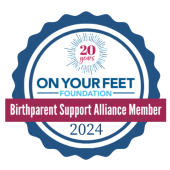How to choose a family
Client Reviews
ACFB was not our first adoptive agency we have explored, but it was the right place for us. They genuinely care about everyone involved in the adoption process, including the birth mothers. They were honest, helpful and supportive. We will forever be grateful, that thanks to ACFB our family is complete.
My daughter was able to place her baby with a lovely couple this week. Thank you, Linda Fiore, for making this all so professional and comfortable as we made the decision that is right for everyone. Thank you to Mary for guiding my daughter so lovingly. God's blessings for the adoptive parents who opened their arms to our whole family. Thank you to all who made this happen! God Bless you!
The best part of working with ACFB is the education you receive before you make any decisions or invest in anything, they want to know your story - the trauma or sadness that you have been through before you start your adoption journey. ACFB creates a successful environment for adoptive parents to create successful families.
How to choose a family
Your birth parent counselor will be at the meeting to support you.
We begin by asking you to identify the criteria most important to you. Perhaps you wish your child to be raised in a city, a suburb, or a small town, or with a family of a particular faith, or with adoptive parents who have similar hobbies or share your beliefs and values.
Once we know your preferences, we provide you with letters and pictures of families that fit your criteria. The profiles give you a snapshot into the adoptive parent’s lives and may include information about their relationship, families, careers, hobbies, lifestyle and much more.
Whichever family you choose, you will have peace of mind knowing your child will be raised in a safe, secure, and loving home. All of our adoptive parents must meet strict state and agency requirements, including a comprehensive examination of their employment history, home, physical and emotional health, finances, and personal relationships. Criminal background checks are also required.
In addition, adoptive families receive professional counseling and training to prepare them for the unique aspects of adoptive parenting. Educational topics vary but may include an explanation of the adoption process and benefits of open adoption, racial or cultural diversity training, and how to talk to kids, extended family, and friends about adoption.
For several months after the placement, a social worker from the Adoption Center for Family Building will monitor your child’s development and how the adoptive family is adjusting.
How to choose a family
Your birth parent counselor will be at the meeting to support you.
I feel like I need to be consistent when referring to the birthparent counselor or advocate. Should we be calling them birthparent advocates? This seems to be a better representation, especially when receiving calls from expectant mothers, because some feel that we’re trying to engage them in therapy when we say counselor. I didn’t know in this section if birth parent counselor should be one of those other terms.
We begin by asking you to identify the criteria most important to you. Perhaps you wish your child to be raised in a city, a suburb, or a small town, or with a family of a particular faith, or with adoptive parents who have similar hobbies or share your beliefs and values.
Once we know your preferences, we provide you with letters and pictures of families that fit your criteria. The profiles give you a snapshot into the adoptive parent’s lives and may include information about their relationship, families, careers, hobbies, lifestyle and much more.
Whichever family you choose, you will have peace of mind knowing your child will be raised in a safe, secure, and loving home. All of our adoptive parents must meet strict state and agency requirements, including a comprehensive examination of their employment history, home, physical and emotional health, finances, and personal relationships. Criminal background checks are also required.
In addition, adoptive families receive professional counseling and training to prepare them for the unique aspects of adoptive parenting. Educational topics vary but may include an explanation of the adoption process and benefits of open adoption, racial or cultural diversity training, and how to talk to kids, extended family, and friends about adoption.
For several months after the placement, a social worker from the Adoption Center for Family Building will monitor your child’s development and how the adoptive family is adjusting.





